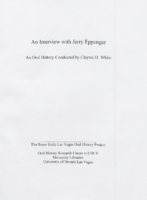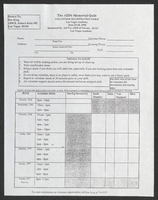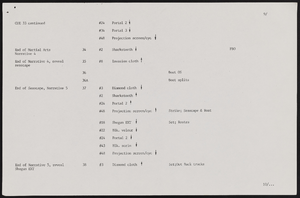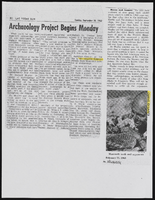Search the Special Collections and Archives Portal
Search Results

Transcript of interview with Doug Unger by Barbara Tabach, August 26, 2014
Date
Archival Collection
Description
Interview with Doug Unger by Barbara Tabach on August 26, 2014. In the interview, Unger discusses his schooling, his family's mattress business, and his endeavors in the company and the mattress industry in Las Vegas. Unger becomes involved in Holocaust education and the Sperling Kronberg Mack Holocaust Resource Center.
Doug Unger was born in Cleveland, Ohio, and grew up working summers in a mattress factory, a family business started by his maternal grandfather. After graduating from high school in Cleveland, Doug attended the University of Cincinnati until moving to Steamboat Springs, and enrolled in Denver University, though ended his college career one class away from graduation. Eventually, Unger moved back to Cleveland, then to Las Vegas. In 1976, Dough bought Supreme Mattress and moved to Las Vegas to build his new business. Outside his successful career, Doug was always an active member in the city's Jewish community. He joined Congregation Ner Tamid, where he was a trustee. He became involved with the Jewish Federation, serving as treasurer and later as president. When he moved to Reno, Doug joined Temples Sinai and Emanu-el, and also became heavily involved with Guide Dogs for the Blind Friends Committee, serving as its director for a period of time. He was also the co-chair of the Governor's Advisory Council on Education Related to the Holocaust (GAC). Doug was instrumental in establishing the Library for Holocaust Studies as a successful organization, independent of the Jewish Federation. The Library is now located in its own, donated space, run by trained staff, and receives $200,000 from the state biennially.
Text

Transcript of interview with Jerry Eppenger by Claytee D. White, September 14, 2011
Date
Archival Collection
Description
Interview with Jerry Eppenger conducted by Claytee D. White on September 14, 2011. Eppenger's family moved from Arkansas to Las Vegas in 1953. Joining the Marine Corps in 1964, he was among the early combatants in the Vietnam War. After a brief time in Alaska, he returned to Las Vegas and found work as a security guard at Bonanza Hotel and Nevada Test Site before attending dealer school. Eppenger recalls local black leaders and describes episodes in segregation and racial relations of 1970s Las Vegas. He shares memories of his beloved Cadillac and the fast and lucrative lifestyle of a dealer.
Text

AIDS Memorial Quilt volunteer registration form
Date
Archival Collection
Description
Text
Las Vegas African American Community Conversations round table interviews
Identifier
Abstract
The Las Vegas African American Community Conversations is a four-part conversation with local Las Vegans. The first part of the round table is moderated by Trisha Geran with a central theme of "Migration, Work and Community Emergence." The panelists discuss the early history of the African American community in Las Vegas, Nevada. They also discuss how and why their families moved to Las Vegas, most citing the economic opportunities as a major factor. The participants share their personal histories and family histories building up the African American community in downtown Las Vegas and the Westside. The second part of the round table is moderated by Sonya Horsford with a central theme of "Education, Economy, and Integration." The panelists discuss the Clark County School District pre- and post-integration. They discuss the hardships of the Sixth Grade Center Integration Plan on the African American community as well as discussing the differences in the school facilities. The round table participants also discuss the social services and social programs and the history of those programs from the African American perspective. They also discuss civic involvement and the various civic groups started by the panelists, and share discrimination they faced.
The third part of the round table is moderated by Claytee D. White with a central theme of "Civil Rights and Entertainment." The panelists discuss the racism and segregation present in Las Vegas and discuss how African American community leaders worked to integrate African Americans into the Las Vegas community. They discuss the 1969 riots in detail, and discuss African American entertainers and the entertainment industry. They share personal experiences working in the entertainment industry and discuss the importance of the local unions, such as the Culinary Workers Union Local 226, the International Alliance of Theatrical Stage Employees Local 720, and their contributions to the unions. The fourth and final part of the round table is moderated by Rachel Anderson with a central theme of the "Early African American Legal Community." The panelists discuss the foundations of the professional legal community in Las Vegas, noting the contributions of Charles Keller, Dr. William Bailey, and the Reverend Marion Bennett as driving forces for civil rights activism in Las Vegas. They share their experiences growing up in Las Vegas facing discrimination and segregation. Lastly, they share the changes they have seen and how both the legal and African African communities have grown.
Archival Collection
Cahlan, John Francis, 1902-1987
John Francis Cahlan, a native Nevadan, worked as the editor of the Las Vegas Review-Journal. He also worked to support education and preserve Nevada history, advocating for the establishment of the Nevada State Archives. He was born in Reno, Nevada in 1902, and attended the University of Nevada, earning a degree in journalism in 1926, and worked for the Nevada State Journal.
Person
Figler, Dayvid, 1967-
Dayvid Figler was born August 18, 1967 in Chicago, Illinois. He was four years old when the family station wagon reached Las Vegas, Nevada in 1971. Figler’s father soon became a Pan dealer on the Strip. As the family grew, his mother, Barbara, immersed her energies in her children’s activities, Hadassah and Temple Beth Sholom. Figler graduated from Valley High School at the age of 16 and by the age of 23 he was rising in the legal world. He was also a local essayist and poet.
Person
Hunsberger, Charles W., 1929-
Charles Hunsberger was born in 1929 in Elkhart County, Indiana. Hunsberger was the director of the Las Vegas-Clark County Library District from 1972 to 1994. He is credited with expanding library facilities and services across Las Vegas, NV and Southern Nevada during the late 1980s and early 1990s. He was responsible for building more than twenty libraries in Southern Nevada; including securing a $22.2 million library bond in 1985 which resulted in the Green Valley, Las Vegas, Spring Valley, Sunrise, and West Las Vegas libraries.
Person
Regency Towers construction set: one-half scale reproductions of architectural, structural, mechanical, electrical, and plumbing drawings
Date
Archival Collection
Description
From the Homer Rissman Architectural Records (MS-00452) -- Regency Towers: Las Vegas, Nevada -- Project drawings file.
Image


